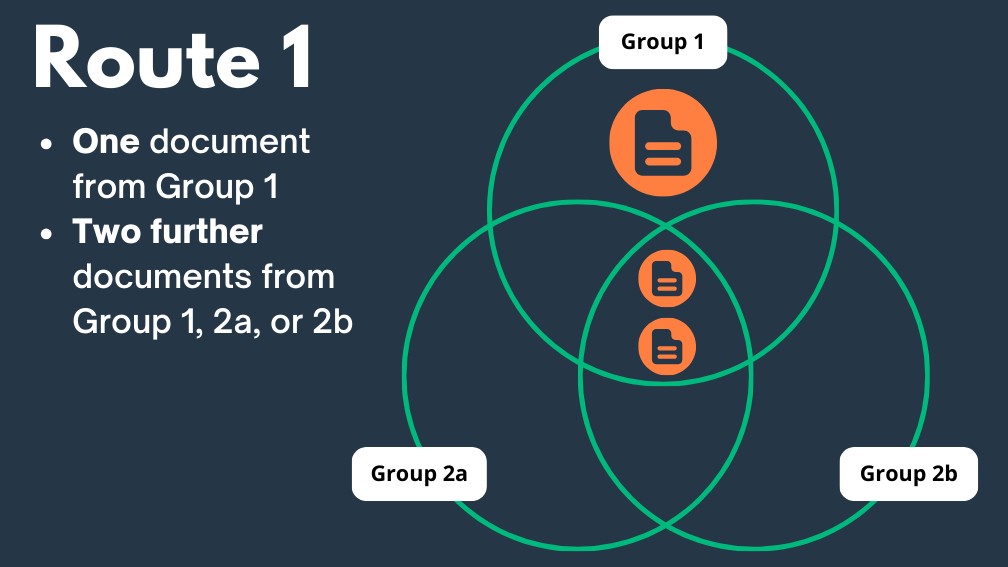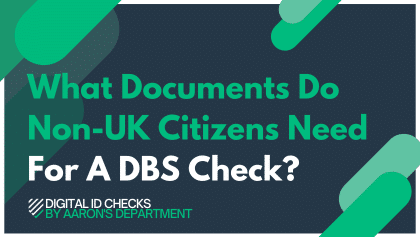When getting a DBS check, applicants must provide their employer with documents to confirm their identity. The specific types of documents, and the combinations required, are different depending on whether the applicant is a UK passport holder, whether they are carrying out voluntary work, and the documents the applicant actually possesses.
What combinations of documents are available for non-UK citizens?
The DBS outlines three “Routes” available for applicants. Each Route represents a different combination of documents, with applicants ideally being able to take Route 1, and moving on to 2 and 3 if they lack the documents required for Route 1.
However, non-UK citizens (those without a British Passport) may only use Route 1.
Documents are categorised into three “Groups”:
- Group 1 – Primary Identity Documents
- Group 2a – Trusted Government Documents
- Group 2b – Financial and Social History Documents


The list of Primary Documents for non-UK nationals is different depending on whether the applicant will be doing paid work or voluntary work. This is in order to confirm the paid applicants’ Right To Work.
Non-UK nationals applying for paid work must provide one ‘Primary Document’ from the “Primary Documents for Paid Working Non-UK Nationals” list below, along with a further two documents selected from Group 1, Group 2a, or Group 2b.
Non-UK nationals applying for voluntary work must provide one Group 1 document, along with a further two documents selected from Group 1, Group 2a, or Group 2b.
Document Groups
Primary Documents for Paid Working Non-UK Nationals
Applicants must provide one ‘Primary Document’ from the list below, along with a further two documents selected from Group 1, Group 2a, or Group 2b.
| Documents and details |
|---|
| A current passport or passport card showing that the holder is a national of Ireland. |
| A current document issued by the Home Office to a family member of an EEA or Swiss citizen, and which indicates that the holder is permitted to stay in the United Kingdom indefinitely. |
| A current Biometric Immigration Document (Biometric Residence Permit) issued by the Home Office to the holder indicating that the person named is allowed to stay indefinitely in the UK, or has no time limit on their stay in the UK. (This can’t be used as a secondary document if it’s already being used as a primary document in this section.) |
| Online evidence of immigration status. Either via the View and Prove service or using the BRP or BRC online service. Issued by the Home Office to the employer or prospective employer, which indicates that the named person may stay in the UK and is permitted to do the work in question. Must be valid. Note: this includes the EUSS digital status confirmation. |
| A current passport endorsed to show that the holder is exempt from immigration control, is allowed to stay indefinitely in the UK, has the right of abode in the UK, or has no time limit on their stay in the UK. |
| A current Immigration Status Document issued by the Home Office to the holder with an endorsement indicating that the named person is allowed to stay indefinitely in the UK or has no time limit on their stay in the UK, together with an official document giving the person’s permanent National Insurance number and their name issued by a government agency or a previous employer. |
| A current passport endorsed to show that the holder is allowed to stay in the UK and is currently allowed to do the type of work in question. |
| A current Biometric Immigration Document (Biometric Residence Permit) issued by the Home Office to the holder which indicates that the named person can currently stay in the UK and is allowed to do the work in question. |
| A current document issued by the Home Office to a family member of an EEA or Swiss citizen, and which indicates that the holder is permitted to stay in the United Kingdom for a time limited period and to do the type of work in question. |
| A frontier worker permit issued under regulation 8 of the Citizens’ Rights (Frontier Workers) (EU Exit) Regulations 2020. |
| A current Immigration Status Document containing a photograph issued by the Home Office to the holder with a valid endorsement indicating that the named person may stay in the UK, and is allowed to do the type of work in question, together with an official document giving the person’s permanent National Insurance number and their name issued by a government agency or a previous employer. |
| A document issued by the Home Office showing that the holder has made an application for leave to enter or remain under Appendix EU to the immigration rules on or before 30 June 2021 together with a Positive Verification Notice from the Home Office Employer Checking Service. |
| An Application Registration Card issued by the Home Office stating that the holder is permitted to take the employment in question, together with a Positive Verification Notice from the Home Office Employer Checking Service. |
| A Positive Verification Notice issued by the Home Office Employer Checking Service to the employer or prospective employer, which indicates that the named person may stay in the UK and is permitted to do the work in question. |
Group 1: Primary Identity Documents
| Documents | Notes |
|---|---|
| Passport | Any current and valid passport |
| Biometric residence permit | UK |
| Current driving licence photocard – (full or provisional) | UK, Isle of Man, and Channel Islands |
| Birth certificate – issued within 12 months of birth | UK, Isle of Man, and Channel Islands – including those issued by UK authorities overseas, for example embassies, High Commissions and HM Forces |
| Adoption certificate | UK and Channel Islands |
Group 2a: Trusted Government Documents
| Documents | Notes |
|---|---|
| Current driving licence photocard – (full or provisional) | All countries outside the UK (excluding Isle of Man and Channel Islands) |
| Current driving licence (full or provisional) | UK, Isle of Man, and Channel Islands |
| Birth certificate – issued after time of birth | UK, Isle of Man, and Channel Islands |
| Marriage/civil partnership certificate | UK and Channel Islands |
| Immigration document, visa, or work permit | Issued by a country outside the UK. Valid only for roles whereby the applicant is living and working outside of the UK. Visa/permit must relate to the non-UK country in which the role is based. |
| HM Forces ID card | UK |
| Firearms licence | UK, Isle of Man, and Channel Islands |
Group 2b: Financial & Social History Documents
| Documents | Notes | Issue Date & Validity |
|---|---|---|
| Mortgage statement | UK | Issued in last 12 months |
| Bank or building society statement | UK and Channel Islands | Issued in last 3 months |
| Bank or building society statement | Countries outside the UK | Issued in last 3 months – branch must be in the country where the applicant lives and works |
| Bank or building society account opening confirmation letter | UK | Issued in last 3 months |
| Credit card statement | UK | Issued in last 3 months |
| Financial statement, for example pension or endowment | UK | Issued in last 12 months |
| P45 or P60 statement | UK and Channel Islands | Issued in last 12 months |
| Council Tax statement | UK and Channel Islands | Issued in last 12 months |
| Letter of sponsorship from future employment provider | Non-UK only | Valid only for applicants residing outside of the UK at time of application. Must still be valid. |
| Utility bill | UK – not mobile telephone bill | Issued in last 3 months |
| Benefit statement, for example Child Benefit, pension | UK | Issued in last 3 months |
| Government, government agency, or council document giving entitlement, for example from the Department for Work and Pensions, the Employment Service, HMRC | UK and Channel Islands | Issued in last 3 months |
| EEA National ID card | Must still be valid | |
| Irish Passport Card | Cannot be used with an Irish passport | Must still be valid |
| Cards carrying the PASS accreditation logo | UK, Isle of Man, and Channel Islands | Must still be valid |
| Letter from head teacher or college principal | UK – for 16 to 19 year olds in full time education – only used in exceptional circumstances if other documents cannot be provided | Must still be valid |
What information is needed to fill out a DBS application form?
To apply, you will need the following information for the applicant:
- Title
- Forename
- Middle Names (if any)
- Surname
- Previous Names (any names they have been known by before)
- Date of Birth
- Place of Birth
- Gender
- Current Address
- At Least 5 Years Previous Address History (with no gaps)
Alternatively, using our online DBS application system, you can create an account for the applicant, and let them fill out the DBS application form themselves!
Summary: DBS Application Form Documents
If you’re applying for a DBS check, you’ll need to provide around three documents to prove your identity and address. The exact combination will be different depending on your circumstances, so if you’ve jumped straight to this summary, it’s well worth reading the rest of this page for guidance!
Our team of DBS experts are also available to answer questions if you’ve still got any! Our fast, simple, and affordable online DBS system processes hundreds of DBS applications for organisations like yours every day. If you’re interested in checks for your staff, or have any questions, feel free to get in touch at contact@aaronsdepartment.com or call 0113 877 0171.
